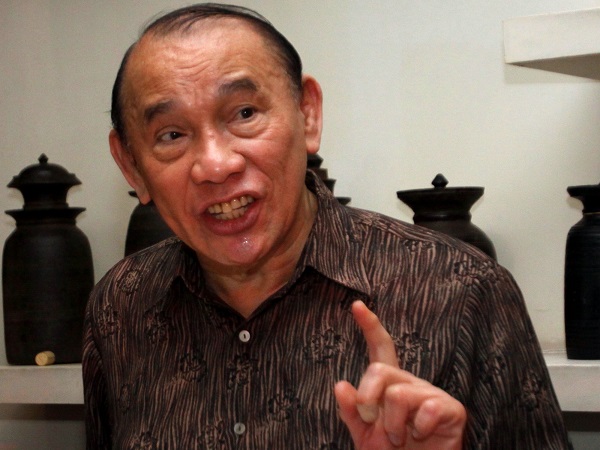CEBU CITY, Philippines—Former Sen. Ernesto “Boy” Herrera died of cardiac arrest at 2 a.m. on Thursday at Manila Doctors Hospital on UN Avenue, Manila. He was 73.
Former Calape, Bohol, Mayor Ernest Herrera said his father was taken to hospital a week ago with a minor health problem, but suffered a mild stroke at the hospital.
He said his father was placed under intensive care to ensure he would get better.
“He was OK. Everything was OK until this (Thursday) morning. He talked. He was conscious. [His] vital signs were OK. Then this morning, it suddenly happened,” Ernest told the Inquirer in a phone interview.
Ernest said his father’s body would be taken to Heritage Park at midnight on Friday.
He said the wake would initially be held in Manila because members of the Senate and the House of Representatives want to pay their last respects to their former colleague.
The body will be taken to Cebu province where the family lives, he said.
Herrera was born in Samboan, Cebu, on Sept. 11, 1942. He is survived by his wife, Lourdes, and four children.
Cory ally
Herrera was an ally of former President Corazon Aquino. He served in the Senate from 1987 to 1998. He also held the seat of the first district of Bohol in the House of Representatives from 1998 to 2001.
Herrera is best known for the 1989 amendment to the Labor Code that legalized “contractualization.”
The Ecumenical Institute for Labor Education and Research (Eiler) said the Herrera Law created the legal grounds for contractual work, which cheapened wages, and allowed the secretary of labor to assume jurisdiction over labor disputes and deploy police and military forces to struck companies.
Agrava board probe
Herrera rose to national prominence as a member of the Agrava Fact-Finding Board that investigated the Aug. 21, 1983, assassination of Sen. Benigno S. Aquino Jr. The board was established on Oct. 14, 1983, and released its findings on Oct. 22, 1984.
Herrera, along with three other members of the board, said in the majority report that Fabian Ver, the military chief of staff of former President Ferdinand Marcos, Gen. Luther Custodio and Gen. Prospero Olivas, chief of the Aviation Security Command, were involved in the assassination.
Herrera graduated with a bachelor’s degree in history and political science from the University of Visayas. He obtained a master’s degree in public ddministration, major in public finance in 1995 and a doctorate degree in fiscal studies in 1998 from the Lyceum of the Philippines.
Herrera spent most of his professional life in the cause of labor. In 1983, he was elected general secretary, vice president and national executive board member of the Trade Union Congress of the Philippines (TUCP).
The TUCP, with 1.2 million members, is the biggest confederation of labor federations in the Philippines. It was founded on Dec. 14, 1975, by 23 labor federations.
Herrera was first elected to the Senate in 1987. He was responsible for landmark reforms in vocational education and training that resulted in the establishment of the Technical Education and Skills Development Authority (Tesda).
He was the only Filipino member of the executive board of the International Federation of Free Trade and Union in Brussels, Belgium, from 1988 to 1992; a consultant on workers education to the International Labor Organization (ILO) in Geneva, Switzerland; and headed the workers delegation to the 75th session of the ILO where he delivered an address on human rights.
Herrera was also the first Asian and the second individual to receive the George Meany International Human Rights Award in 1985.
TUCP leadership dispute
In November 2011, Herrera, then the general secretary of the TUCP, assumed the group’s presidency after Democrito Mendoza resigned as president.
Mendoza, however, revoked his resignation after his faction accused Herrera of misrepresentation as to which TUCP group he belonged to. Herrera and his supporters were later expelled.
Mendoza’s group occupied the TUCP office in Quezon City and evicted Herrera and his supporters.
But Herrera continued to be recognized by the Belgium-based International Trade Union Confederation and other international labor groups. His faction also retained control of the TUCP website.
The Department of Labor and Employment’s Bureau of Labor Relations (BLR) intervened after both factions elected separate sets of officers.
In August 2012, the BLR issued a status quo ante order returning Mendoza and Herrera to their previous positions and ordering the holding of special elections.
Herrera appealed the decision to the secretary of labor. When this was rejected in May 2013, Herrera elevated the case to the Court of Appeals.
In October 2013, the appellate court annulled the BLR order and validated Herrera’s ascension as TUCP president.
In June 2015, the Supreme Court affirmed with finality the reinstatement of Herrera as the legitimate president of the TUCP, ending a four-year leadership squabble within the country’s largest labor group. With a report from Inquirer Research


